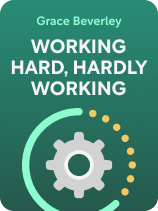

This article is an excerpt from the Shortform book guide to "Working Hard, Hardly Working" by Grace Beverley. Shortform has the world's best summaries and analyses of books you should be reading.
Like this article? Sign up for a free trial here.
Do you feel guilty when you practice self-care? Do you think it’s a waste of time?
Grace Beverley wants you to stop seeing self-care and productivity as opposites. She discusses two common barriers to self-care and shares advice on how to overcome them so that you can take care of your health and be more productive as a result.
Keep reading to learn about these barriers to self-care and the remedies.
Barriers to Self-Care
Beverley says that self-care is the antidote to overwork. You need to nurture your physical and mental health so productivity doesn’t burn you out. However, she acknowledges that engaging in self-care is often easier said than done. She emphasizes two common barriers to self-care and provides tips for overcoming them.
Barrier #1: Shame
We tend to feel ashamed about engaging in self-care due to our belief that it’s lazy and indulgent. Therefore, we avoid practicing self-care.
(Shortform note: According to one psychologist, this belief may stem from unmet childhood needs. If parents convey that their child should suppress their emotional needs to meet others’ needs, the child internalizes this message, making it an unconscious belief. Then, as an adult, the individual automatically thinks they should prioritize others’ needs over their own, contributing to their belief that self-care is lazy, shameful, and indulgent.)
Barrier #2: Limited Time
It’s challenging to carve out time for self-care when we’re busy with work, chores, and other obligations.
(Shortform note: Our tendency to fill free time with work-related tasks may contribute to this barrier. In Four Thousand Weeks, Oliver Burkeman observes that we often spend our free time completing unnecessary work tasks, such as answering emails that don’t require our attention. He explains that we do this because we feel we must spend our free time productively—a widespread belief dating back to the Industrial Revolution.)
Beverley says you can overcome these barriers by no longer seeing self-care and productivity as opposites. Specifically:
- Overcome the barrier of shame by recognizing that self-care supports productivity and vice versa.
- Overcome the barrier of limited time by integrating self-care time into productivity time.
Let’s further explore how to overcome these two barriers.
How to Overcome the Barrier of Shame
Beverley recommends overcoming the shame you associate with self-care by dissolving the conceptual barrier between self-care and productivity. Stop seeing self-care as laziness and indulgence—the opposite of productivity. Instead, see self-care as productive. It restores your mental and physical energy, boosting your overall productivity. For example, a well-rested and mentally healthy songwriter will be able to efficiently produce meaningful songs.
Furthermore, see productivity as a form of self-care. When you work productively, you’re caring for yourself by leaving more time for replenishing activities, such as hobbies. Additionally, productive work sessions can leave you feeling energized—and pursuing energizing experiences is a form of self-care.
(Shortform note: Beverley’s claim that productivity and self-care support each other suggests that the two form a feedback loop, specifically what James Clear (Atomic Habits) calls a reinforcing feedback loop. This is when the outcome of a behavior heightens the effect of that behavior, helping you build a positive habit. For instance, the behavior of working productively may result in the effect of more energy and time for self-care, making it easier to build a positive habit of engaging regularly in self-care. Similarly, the behavior of engaging in self-care may result in more mental and physical energy, making it easier to build a positive habit of working productively.)
How to Overcome the Barrier of Limited Time
Beverley says you can overcome the barrier of limited time by integrating productivity time with self-care time. Do this by taking care of yourself even when you’re working productively. For example, when working on a project with a tight deadline, remember to eat nourishing meals and take occasional breaks.
(Shortform note: Beverley’s recommendation is an example of both/and thinking—when you acknowledge that two realities can both be true. You can be both productive and engage in self-care. This is the opposite of either/or thinking—when you see two options as mutually exclusive. Some experts say that replacing either/or thinking with both/and thinking can help you generate creative solutions that exist between opposite options. That could look like generating creative ways to take care of yourself while you’re working. For instance, set a daily alarm reminding you to eat a healthy snack, or keep a mini-trampoline in the corner of your office so you can have fun and get some quick exercise during your breaks).

———End of Preview———
Like what you just read? Read the rest of the world's best book summary and analysis of Grace Beverley's "Working Hard, Hardly Working" at Shortform.
Here's what you'll find in our full Working Hard, Hardly Working summary:
- Why self-care and productivity require one another
- How to use your work time wisely and make work tasks more enjoyable
- How regular self-care can help you prevent burnout






